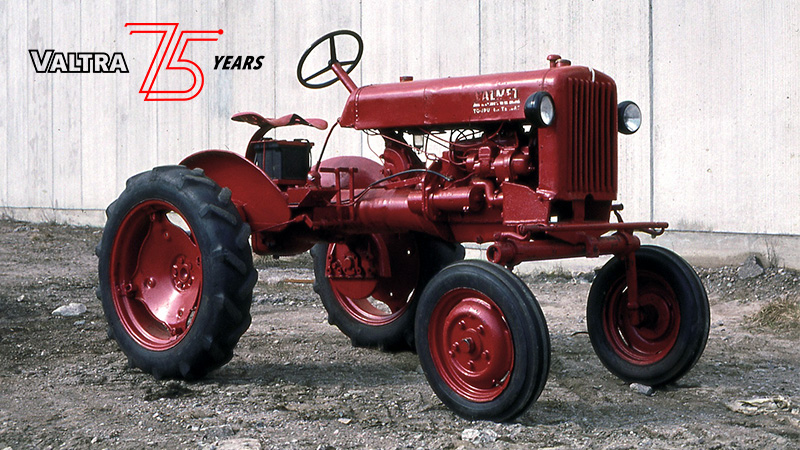On top of a long list of farming equipment, contractor and farmer Will Chapman, based at Lilac Farm, between Kings Lynn and Fakenham in Norfolk runs nine Valtra 250 hp T234 Versu tractors. Why? Simply this: When existing tractors came up for replacement Will gave his drivers a choice and they preferred, chose, Valtra.
W R Chapman & Son was founded three generations ago by Bill Chapman as a plant hire business and continued under his son. However, despite having worked on many and varied bits of kit when not at school, grandson Will was not really interested in the plant hire business; more in farming.
“I wasn’t the most academic of pupils but thanks to my family and the staff here I was capable of undertaking a great many repairs by the time I got to secondary school.”
On leaving school Will worked on several Norfolk farms, gaining further extensive experience. That was until his grandfather came up with something of an ultimatum; ‘Come home and run a business properly or go your own way.’ Will chose to return home.
Today, several years on Will, married to New Zealander Alexandra is now firmly in the driving seat, running both the farming and agricultural businesses plus the rather diminished plant hire business with assistance from his brother Ben and wife.
“The plant hire business has diminished simply because the profitability has gone out of it,” Will comments.
Will Chapman with driver Richard Carroll – ‘The drivers chose Valtra’.
Engaged people and well-managed machinery
As time progressed both the agricultural contracting and farming grew and today the farm extends to some 1,200 acres while the contracting business continues to go from strength to strength. Ask Will why and he thinks for a moment or two and then says he believes staffing is at the bottom of it all.“There appear to be plenty of managers but in recent years the number of home grown people prepared to work the long hours in sometimes difficult weather has shrunk significantly.”
Will employs a mix of local and foreign drivers from a variety of countries.
“We don’t employ people from overseas because they may be cheaper. It doesn’t work like that, everyone gets paid well – and the same. The criteria is simply; can they do the job and are they prepared to work the hours to get it done? Oh, and will they look after the machinery.”
W R Chapman & Son’s kit is well used. It has to be to justify purchase. Currently there are four combines (and that may be increased to five for next season), a pair of self-propelled forage harvesters, a self-propelled sprayer and a large, (very large,) slurry spreading machine. Add to this some large tractors including a tracked Challenger, and the nine Valtra T234 Versu machines plus a range of ploughs, planters and other equipment including trailers of various types. Are they all bought and paid for? The businessman in Will comes to the fore and he is honest about this.
“Some are on finance and others paid for – we own them. Today’s finance, especially from manufacturers, can be cheap money and my accountant advises me on the best way to use it.”
W R Chapman are looking to extend their farming operation and having ready cash available to purchase suitable land is important. There is also the management of machinery to consider. Will explains; “If a machine is on finance it is important not to exceed agreed hours. With several models of the same make on the fleet – be it tractor, combine, forage harvester, indeed anything, if the hours start to build on a particular machine we can swap its duties with different low hour machine and even things out. It’s all in the management.”
One of the Valtra collects a load of Maize for transfer to an artic truck.
Growth is the way ahead
From his base most work is in North Norfolk.“We plant and combine cereals right up to the coast near Wells-next-the-Sea and this can be followed by round baling and soil preparation for the next crop. We spread slurry from many of the county’s pig farms and used digestate from anaerobic digesters which brings things nicely to the company’s maize and rye silage operations.”
Will grows and harvests over 1,000 acres or rye and 6,500 acres of maize for silage which is then fed into the digesters.
“At the moment building work, expansion is going on at the main digester site so we have a couple of systems in operation. With one system, the one with the lowest haul distance we harvest direct into trailers that are emptied into AgBags. Quite a simple system now but later we will then have to move the silage from the bag site to the digesters.”
The second system is a little more complicated and is used for harvesting more distant crops. The forage harvester fills Belgian made Dezeure trailers. “These are a little special,” says Will.
“They have moving floors and the rear can be lifted hydraulically to clear truck sides. Hydraulic rams on the drawbar and axles also level the trailer to make the operation safe. Operation is by remote control so that the tractor driver is also the banksman, instructing the truck driver when to move forward as his semi-trailer fills.”
A full Dezeure self levelling trailer load of maize is transferred to the road truck. Control of the unloading is remote allowing the tractor driver to act as banksman for the truck driver.
With the semi trailer full the driver heads to the silage clamp adjacent to the digester where it tips. Spreading and compaction is undertaken by large, specialist, tractor dozers, tracked and wheeled. Apart from silage for the digester, the maize and rye operation have the added advantage of helping control blackgrass, an increasing problem in cereals on many soils in the area.
So what of the future for W R Chapman & Son? On the basis of, if a business doesn’t grow it will go down hill, Will sees growth as the way ahead.
“We have plans to extend our farmed land and we have regular enquiries from farmers to handle their field work.”
Will is looking at the purchase of another combine harvester – on tracks. He is also looking at a couple more Valtra tractors, but this time 271 hp T254. Why?
“Valtra are reliable, true we’ve had occasional minor problems, but with a tight operation like ours reliability is very important. The price is right, also important. Finally they are simple to operate. I feel that anyone can drive them and they’re all the same – no problems with changes in driver or work. I like to keep everything simple.”

